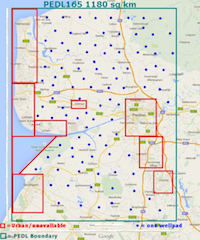Why are the comments more interesting than the articles?
I am obviously not referring to the comments on the Telegraph pages which seem to be the unique preserve of a certain kind of swivel-eyed, anti-EU, foaming at the mouth Farage-alike.
I am referring here to the Guardian comments on a “Comment Is Free” article penned by an American politician who seems rather keen on shale gas. The article itself is notable only for the amount of pro-shale PR it manages to squeeze into such a small space.
The comment that caught my eye went as follows
John Hanger rightly raises the radiation risk from nuclear power, but wrongly overlooks the radon risk from fracking, that has received no press coverage at all in the UK: the prospective human health hazard of using fracked shale gas.
Heath minister Anna Soubry told Labour MP Paul Flynn in a written Parliamentary answer in May Public Health England (formerly the Health Protection Agency)
“is preparing a report identifying potential public health issues and concerns, including radon (release/emissions) that might be associated with aspects of hydraulic fracturing, also referred to as fracking. The report is due out for public consultation in the summer. Once released for public consultation, the report will be freely available from the PHE website.”
(Hansard, 20 May: Column 570W)PHE is concerned to evaluate the potential risks of radon gas being pumped into citizens’ homes as part of the shale gas stream. Unless the gas is stored for several days to allow the radon’s radioactivity to naturally reduce, this is potentially very dangerous.
Radon is unquestionably the leading cause of lung cancer in non-smokers. Initially radon released from its virtually sealed underground locations will be in monatomic suspension, but then it accretes onto dust particles, pipework, etc, and some of it may remain suspended in the gas and come out in our cookers.
The current concern about how much radon is likely to be piped into people’s kitchens was spurred by a report last year by Dr Marvin Resnikoff, of Radioactive Waste Management Associates, now based in Vermont, but for many years based in Brooklyn, New York.
Dr Resnikoff estimated radon levels from the Marcellus gas field – the nearest one being exploited to New York and presumably recently overseen by Mr Hangar – as up to 70 times the average. The United States Geological Survey (USGS) last autumn released a report measuring actual levels at a handful of Marcellus wells, having been apparently upset by Dr Resnikoff’s charge that USGS had been a “tool” of industry” in downplaying possible hazards.
I am all for creating new jobs in the energy sector, as long as they are sustainable. The public surely will demand the unadulterated facts on fracking. Public Health England’s forthcoming report is eagerly awaited.
Dr David Lowry
Environmental policy and research consultant
Add lung cancer to the list of health concerns then shall we?





























